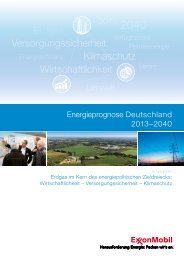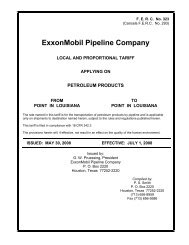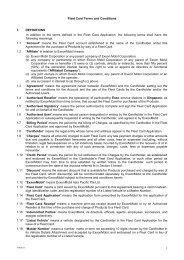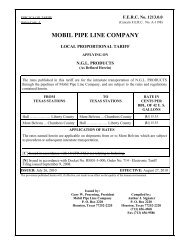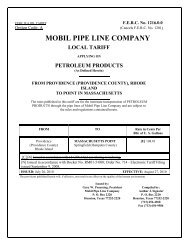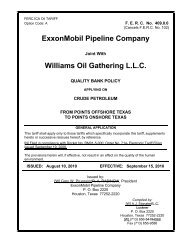Number 4 - ExxonMobil in the UK
Number 4 - ExxonMobil in the UK
Number 4 - ExxonMobil in the UK
You also want an ePaper? Increase the reach of your titles
YUMPU automatically turns print PDFs into web optimized ePapers that Google loves.
“<br />
What’s very<br />
important is for<br />
policymakers<br />
to take <strong>in</strong>to<br />
account all<br />
<strong>the</strong> cost and<br />
benefit options<br />
<strong>in</strong> develop<strong>in</strong>g<br />
programs for<br />
emissions<br />
reductions.<br />
”<br />
and that develop<strong>in</strong>g countries will<br />
account for a significant portion<br />
of emission <strong>in</strong>creases, any policy<br />
framework must encourage<br />
global engagement.<br />
In addition, <strong>ExxonMobil</strong> believes<br />
<strong>the</strong> best policies are ones that<br />
let market prices drive <strong>the</strong> selection<br />
of solutions, <strong>in</strong> part because<br />
markets are best at select<strong>in</strong>g<br />
and deploy<strong>in</strong>g new technologies.<br />
A uniform and predictable cost<br />
for carbon across <strong>the</strong> economy<br />
also will allow markets to work<br />
effectively, ensur<strong>in</strong>g economic<br />
efficiency and <strong>the</strong> greatest reduction<br />
<strong>in</strong> emissions for <strong>the</strong> lowest<br />
cost. Adm<strong>in</strong>istrative simplicity and<br />
transparency – for companies and<br />
consumers – are essential, and<br />
any sound policy must evolve and<br />
adjust as climate science develops<br />
and we see <strong>the</strong> impacts of<br />
climate policy on <strong>the</strong> economy.<br />
What’s very important is for<br />
policymakers to take <strong>in</strong>to account<br />
all <strong>the</strong> cost and benefit options <strong>in</strong><br />
develop<strong>in</strong>g programs for emissions<br />
reductions, whe<strong>the</strong>r <strong>the</strong>y <strong>in</strong>volve<br />
cap and trade, carbon tax or<br />
some o<strong>the</strong>r approach. <strong>ExxonMobil</strong><br />
will cont<strong>in</strong>ue to be a constructive<br />
participant <strong>in</strong> <strong>the</strong>se dialogues.<br />
Q: Throughout <strong>the</strong> 110th<br />
Congress <strong>the</strong>re were multiple<br />
proposals for <strong>in</strong>creased taxes on<br />
<strong>the</strong> oil <strong>in</strong>dustry and, <strong>in</strong> fact, as part<br />
of <strong>the</strong> federal bailout package for<br />
Wall Street, $9 billion <strong>in</strong> additional<br />
taxes were levied. There is serious<br />
talk of impos<strong>in</strong>g a w<strong>in</strong>dfall profits<br />
tax on oil and gas companies.<br />
<strong>ExxonMobil</strong> has, and obviously<br />
will, oppose such measures. Why?<br />
A: For every dollar we earn, we<br />
<strong>in</strong>cur two and a half dollars <strong>in</strong><br />
taxes that governments use to<br />
provide schools, roads, hospitals<br />
and o<strong>the</strong>r essential services. In<br />
<strong>the</strong> United States alone, our total<br />
tax obligations dur<strong>in</strong>g <strong>the</strong> fiveyear<br />
period of 2003 to 2007<br />
were $64.7 billion, exceed<strong>in</strong>g<br />
our earn<strong>in</strong>gs from U.S. operations<br />
by $18.7 billion.<br />
Yet, unfortunately, some are<br />
propos<strong>in</strong>g that new taxes should<br />
be imposed on American energy<br />
companies. There’s no question<br />
that additional punitive taxes will<br />
limit <strong>the</strong> <strong>in</strong>dustry’s ability to <strong>in</strong>vest<br />
<strong>in</strong> new supplies,<br />
which conceivably<br />
could moderate<br />
price <strong>in</strong>creases to<br />
To learn more<br />
exxonmobil.com/<br />
election<br />
provide <strong>the</strong> economic stability we<br />
spoke about earlier. Punitive taxes<br />
don’t offer any susta<strong>in</strong>able, longterm<br />
solution to help develop new<br />
energy supplies. In fact, some<br />
of <strong>the</strong>m, such as <strong>the</strong> w<strong>in</strong>dfall<br />
profits tax, have been tried <strong>in</strong> <strong>the</strong><br />
1980s, and <strong>the</strong>y resulted <strong>in</strong> higher<br />
imports and reduced domestic<br />
production. <strong>the</strong> Lamp<br />
14




